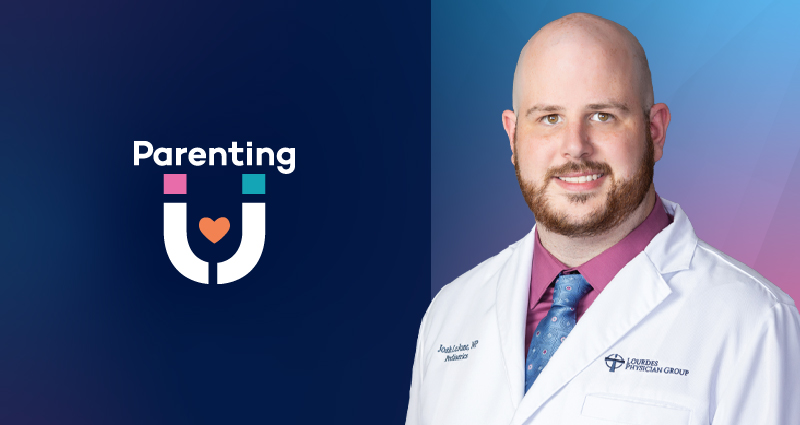Summer brings a welcome break from early alarms and homework, but for kids with ADHD, the lack of structure can create challenges.
Josh LeJeune, NP, pediatric primary care provider with Our Lady of Lourdes Children’s Health, offers insightful and practical guidance for parents raising children with ADHD in this ParentingU podcast episode. His advice is valuable for parents of neurotypical kids, too.
Why Summer Can Be Tough with Kids with ADHD
“(A child with) ADHD thrives in structure,” Josh says. “When we remove that structure, like in the summertime, a lot of the symptoms can start to become more evident.” Without the natural schedule of a school day, kids with ADHD may struggle with mood regulation, impulsivity, focus and even social skills.
That’s why Josh recommends creating a flexible, consistent daily routine. It doesn’t have to mimic the school year with strict start times and back-to-back tasks, but it should give your child a sense of predictability. “It helps their body stay regulated and also helps the parents,” he says.
One approach that works well is creating a visual schedule for younger children — pictures of meals, chores, free time and bedtime activities laid out like a simple roadmap for the day. For older kids, involving them in creating the plan can give them a sense of ownership and motivation to follow it.
Make Time for Social Skills
Summer can sometimes feel isolating for kids with ADHD. Without the built-in peer interaction of school, kids may miss opportunities to practice and grow their social skills.
“We want to definitely make sure that we don’t end up isolated,” Josh says. “That actually can make ADHD symptoms worse.”
Josh suggests checking out camps — even those tailored specifically for kids with ADHD — and tapping into community resources like libraries, art programs, STEM activities or summer sports. And for younger kids, simple playdates at the park or game nights at home can go a long way.
“There’s lots of community resources,” Josh says. “Even volunteering can be a good option for older kids.”
Just as important as getting out of the house? Teaching social skills is key to kids’ overall development.
“One of the big things with ADHD is we also need to teach them how to act socially,” he says. “Sometimes they don’t know how to just join in with kids who are already playing or how to read other people’s social cues. Summertime is a great time to work on building those types of skills so they’re more confident going into those situations.”
That can include role-playing, talking through real-life scenarios, and practicing what to say or do — something Josh calls social coaching.
Should You Take a Medication Break?
If your child takes ADHD medication during the school year, you may wonder if a summer break makes sense.
“That’s a big question I get,” Josh says. “And the short answer is: It depends. It’s not a one-size-fits-all.”
Some kids do well staying on medication year-round, especially if it helps with emotional regulation or behavioral challenges. Others may benefit from a break, particularly if they experience side effects like appetite suppression and need time to “catch up” nutritionally and physically.
“We’ll sit down and have an open pros and cons conversation that involves the child,” Josh says. “Some kids love being on their meds, don’t want to stop, and have no side effects. But others may be ready for a break.”
There are also strategic reasons to pause. For some kids, taking time off in the summer can help lower tolerance to medication, making it more effective when school starts again.
Still, not every medication can be stopped cold turkey. “Some need to be tapered. Others, if you stop them too long, take four to six weeks to build back up — and then there’s not really a benefit to the break,” he explains.
In short: “It’s unique to every kid. I definitely recommend it be a conversation with your provider to see what works best for your family.”
The Sleep Struggle Is Real
Sleep is one of the most common challenges for kids with ADHD, and summer’s flexible schedules don’t help.
“ADHD and sleep challenges often go hand in hand,” Josh explains. “They have difficulty falling asleep due to delayed melatonin production. They typically have racing thoughts. They’re restless.”
As tempting as it is to let kids stay up late and sleep in, that can throw things further off track. Instead, he recommends a consistent, but not rigid, sleep routine.
“It doesn’t have to be the same as during the school year,” he says. “But we want a consistent bedtime and wake time, like a 9 p.m. bedtime and 7 or 8 a.m. wake-up, to give them structure.”
Josh also recommends winding down with a calming bedtime routine: dimming lights, turning off screens at least 30 minutes before bed and doing things like warm baths, soft music or reading.
If screens can’t be avoided, tools like blue light filters or night shift modes can help reduce stimulation. Other techniques like white noise, bedtime yoga or light stretching can also support relaxation.
Don’t Forget to Support You, Too
Parenting a child with ADHD, especially during an unstructured season like summer, can be incredibly rewarding but also emotionally and physically exhausting. Josh reminds parents: Take care of yourself, too.
“You’re going to show up better for your child if you’re giving yourself some grace and taking care of your own needs,” he says.
That doesn’t mean carving out hours of alone time (though that’s great if you can get it!). It means small, intentional resets and accepting that imperfection is part of the process.
“We don’t want parents to feel like they’re alone in this,” Josh says. “You’re doing important work, and it’s OK to ask for help.”
Summer doesn’t have to feel chaotic. With the right balance of structure, flexibility and support, your child can thrive emotionally, socially and physically.





